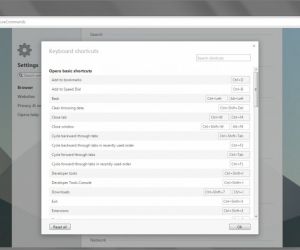

- #OPERA BETA EXPORT SPEED DIAL FULL#
- #OPERA BETA EXPORT SPEED DIAL PASSWORD#
- #OPERA BETA EXPORT SPEED DIAL DOWNLOAD#
- #OPERA BETA EXPORT SPEED DIAL WINDOWS#
#OPERA BETA EXPORT SPEED DIAL WINDOWS#
Windows that have been blocked may be later opened at the user's discretion. By default, Opera blocks all unrequested pop-ups and the behavior may be set on a per-site basis. Pop-up blocking Opera allows its users to control whether web sites may open pop-up windows.
#OPERA BETA EXPORT SPEED DIAL PASSWORD#
With the password manager, when a user re-visits these pages, the username and password fields will be already filled in. Password manager Each time a web page includes a password form, users have the option to store that password for later use. Zooming can be done using multi-touch pinching gestures on supported platforms.
#OPERA BETA EXPORT SPEED DIAL FULL#
Full page zooming prevents inconsistencies that occur when regular text enlargement forces the content to be bigger than its container. Extensions may also be used to do this and to enable high contrast coloured fonts. Instead of just making the text bigger, this feature expands all page elements, including text, images, videos, and other content such as Adobe Flash, Java and Scalable Vector Graphics to be increased or decreased in size (25% to 500%). Page zooming Opera offers full page zooming. The fate of it on its mobile browsers is uncertain. Īround April 2019, Opera removed this functionality in its desktop browsers and it's no longer supported on desktop.

This technique is also used in Opera Mini for mobile telephones. This process reduces the total amount of data sent and is particularly useful with slower internet connections, making pages load faster, or when there are restrictions or costs dependent upon the amount of data transferred. Opera Turbo When Opera Turbo mode is enabled, Opera compresses requested web pages (but not HTTPS secure pages) by up to 80%, depending upon content, before sending it to the user.

Forward-right-clicking anywhere and dragging the mouse towards the right.Back-right-clicking anywhere and dragging the mouse towards the left.Some of the default mouse gestures include: This option is similar to using keyboard shortcuts, as it saves time since users do not have to navigate to graphical buttons using the mouse pointer (thereby avoiding usability problems relating to Fitts' Law). Mouse gestures work by holding the right mouse button, moving the mouse a certain direction, then releasing the button. Mouse gestures Opera was one of the first browsers to support mouse gestures, which allows patterns of mouse movement to trigger common browsing actions, such as "back" or "refresh". This may be useful for users who are connected on dial-up via modem or on a slow wireless/cellular connection that may charge for the amounts of data downloaded. Image loading setting Opera offers the option to load a page without images, or to use only images already in the web cache. Developers can easily create extensions using open standards ( HTML5, CSS, JavaScript) and specific extensions can be created to function as Speed Dial items. Extensions Extensions allow users to easily add functionality to their Opera browser, as well as share most APIs with the Chromium extension model.
#OPERA BETA EXPORT SPEED DIAL DOWNLOAD#
When a download begins, a pop-up and a button will appear at the top-right area of the interface to show the download progress. It also keeps the history of downloaded files and allows opening the files-or the folder where the file has been downloaded to-from within the browser. Users can also access recently closed tabs from other devices synced to their Opera account, including tablets and phones.ĭownload manager Opera allows its users to pause, resume, or restart the transfer of files. Closed tabs can be recovered in the reverse sequence in which they were closed, by default this is achieved via the keyboard shortcut Ctrl + Shift + T. This article details features of the Opera web browser.Ĭurrently supported features Access recently closed pages Opera allows its users to retrieve all of the tabs or windows closed earlier in the current session from a list. The Red O-Letter-Logo of the Opera Browser, in use since September 2015.


 0 kommentar(er)
0 kommentar(er)
